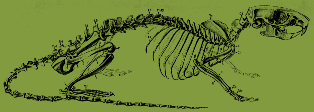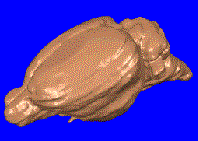
What Eats the Monkey Chow?

My experiences feeding rats
Only very slightly updated March 25, 1996Minor corrections made January 29, 2001


This page is not done yet, and it hasn't been proofread (and most likely never will be) and I tend to ramble aimlessly given the chance, so please forgive any incoherencies or mistakes.
I put off writing this mostly because I didn't want to give anyone any really bad advice. But a lot of new rat owners don't know much at all about what to feed their rat, and end up with a toad who only eats the sunflower seeds out of the gerbil mix they get instead of real food. (Like my first rat.) So I'll at least say what I know, which is better than nothing. If I make any mistakes, and you are someone who knows better, please email me and let me know.
The basis of my rats' diet is either some brand of rat food (Harlan Teklad or Purina Rat Chow for instance) and/or Debbie Ducommun's rat food recipe and diet. (See Debbie's Rat Fan Club web site, you can get this info in the Rat Health Care book.) The nutritional needs of a rat are quite different from other rodents, and unless you know them all and can make your own rat food, you should be feeding your rat some sort of rat chow (sometimes called lab blocks). You can usually get this in bulk at pet stores, or at least in little bags. There are several brands, my rats like Harlan Telkad the best. That is to say, they will eat them, not that they are crazy about them. There are some other brands that the rats simply shove out of their food dish and bury, as if I had mistakenly put rocks in their food dish and they wished to correct my mistake.
The basic problem with feeding your rat food designed for hamsters or gerbils is that your vastly superior rat simply has different requirements from those pitiful little animals. Your rat needs protein, but if you feed them a seed mix they eat lots of seeds, nuts, etc., whatever they can find in the mix. This stuff is really fatty too, and one day you find that when your rat sits down he/she's nearly as wide as long. And your rat may end up getting all scabby (literally, it causes skin problems) from getting way too much protein and fat. Rat chow is much lower fat, but high enough in protein for your rat. There are other good things in rat chow for your rat (vitamins and nutrients and all that) that are hard to find elsewhere, but I won't go into those, as I wouldn't really know what I was talking about. A little hamster mix once in a while won't hurt, just don't over do it, and if your rat shows any skin problems at all, do away with it entirely. (Peanuts can be particularly troublesome for some rats.)
Now, while in theory your rat could live off of lab blocks alone (many lab rats do) this does not mean that your rat will enjoy this. Think of it this way -- the part of a rat's brain devoted to smell and taste is a larger portion of his/her grey matter than the portion of your brain devoted to sight. Your rat needs some entertainment. And variety seems important -- there are many things that my rats will happily eat for a day or two, but then they become bored of it and want something new.

The most common thing to add to your rat's diet are fresh vegetables and fruits. Broccoli, peas, green beans, carrots, tomatoes, bananas, cherries, whatever. I can't think of any vegetable I've offered them that they didn't like, although there are some (like asparagus) that they will only eat for about a day. Rats love lettuce, but it doesn't offer them all that much in any sort of real food value. I occasionally give them just a little with their other food, but generally you'd be better off giving them spinach or some other vegetable. Broccoli is great, and some studies claim to show it can reduce the rate of tumors in rats. Be warned it can make your rat's cage kind of stinky if you feed them a lot for several days in a row. But if you can stand it (sure you can!) the rats love it, and it's good for them. Mine get some nearly every day.
One warning that especially goes for veggies, but to some extent with any sudden change in diet -- it can upset your little rat's digestive system. Lots of vegetables all the sudden (especially leafy vegetables) can cause diarrhea, which in turn can cause dehydration. So if you change your rats diet, take it easy. My rats get lots of fruits and vegetables, but they get them every day, and if for some reason I have to stop (like if I'm gone for a few days) I ease them off of veggies and (especially) ease them back onto them over a few days.
Another treat I often give my rats caused a very strange and mind bending thing to happen to me one day. I was in the pet store buying a bunch of stuff, and as I walked up to make my purchase suddenly the lady behind the counter said, "What eats the monkey chow?" As this sentence made no sense to me, my mind automatically tossed it out, and I said, "What?" hoping that the next try would yield something coherent or at least relevant to what I understood to be my current situation.
She repeated, "What eats the monkey chow?" I was then unfortunately very sure that this was, in fact, what she had said, and my mind had the uncomfortable task of trying to make sense of it. Surely this is some code phrase, to which I am to respond with some key phrase like "The man who has lost his shoe," or she will shoot me because I know too much. Finally just as I was about to abandon all hope of tying this to reality, she picked up a bag, shook it (shake shake shake) and said, simply, "Monkey chow."
At this point I was very sure that I had gone insane. It was like a Monty Python sketch, and I expected her to start shouting "THREE! TWO! ONE!" and then write something down in a small notebook. Only after what seemed like hours did it slowly start to occur to me that maybe she was referring to the parrot biscuits (in the bag she had picked up) as "monkey chow."
And she was indeed. These are little tan/yellow blocks about the size of your rat's head. It's primate food. But parrots love them, and since most pet stores have an infinitely large parrot to monkey ratio, they are often called parrot biscuits. My vet told me they are a little higher fat than lab blocks, but not too bad, and your rat will love them. Mine take them along wherever they go, and use them for pillows/midnight snacks.
That's all for now. I will add more to this section later.
One thing we occasionally give our rats is peanut butter. They love it. And it makes for a great trick to convince people that rats won't bite -- we always feed them peanut butter by letting them lick it off our fingers. (I wouldn't advise doing this with a rat that hasn't been hand fed a lot, though.) We just give them a little, and not very often. It's high in fat, which is not good. And don't give them very much, it can get stuck to the roof of their mouths, which they hate, and they can choke on it.
Mentholatum, for instance. It might surprise you, but apparently rats think Mentholatum is delicious and will leap at the opportunity to eat some. It will give your rat minty fresh breath. But then you try to explain to the poison hotline person at the vet school that "I just caught my pet rat Wotan eating Mentholatum and what should I do now please?" (First you have to get past the, "You have a pet rat?") Don't try this at home kids. (Wotan was ok.)
Also, orange juice. (Or more to the point, d-limonene.) In a March 12, 1992 NPR Morning Edition report, James Swenberg (University of North Carolina) said, "It turns out that about two glasses of orange juice contains a carcinogenic amount of d-limonene for the male rat, but it has absolutely no effect on mice or on female rats, and I'm sure it has no effect on humans." It seems that d-limonene and some other chemicals bind to a naturally occurring protein alpha2u-globulin in the male rat's kidneys. The protein then builds up and causes cancer. Who would have thought? The same protein is not present in female rats or most other animals of either sex, but is present in all but one of the strains of male rats they studied. (Male rats of the NBR strain are the only ones studied that don't have alpha2u-globulin.)
D-limonene is found mainly in citrus oils (but some other natural oils as well) and is used as a flavor and fragrance additive in food, cleaning products, even shampoo. In oranges as far as I can tell d-limonene is mainly in the orange rind and gets into the juice either during the juicing process or as an additive. People I know who have fed their rats oranges have had no problems, maybe because they don't eat the rinds, maybe because some domestic male rats don't have this problem. I don't know, but I'm not taking any chances!
Copy machine toner, unleaded auto fuels, and some bathroom deodorizers also contain such male rat kidney cancer inducing chemicals. (In fact the cancer warning you see at the gas pump is because of this!) But I don't think you are very likely to feed those to your rats.
 Return
to rats
Return
to rats